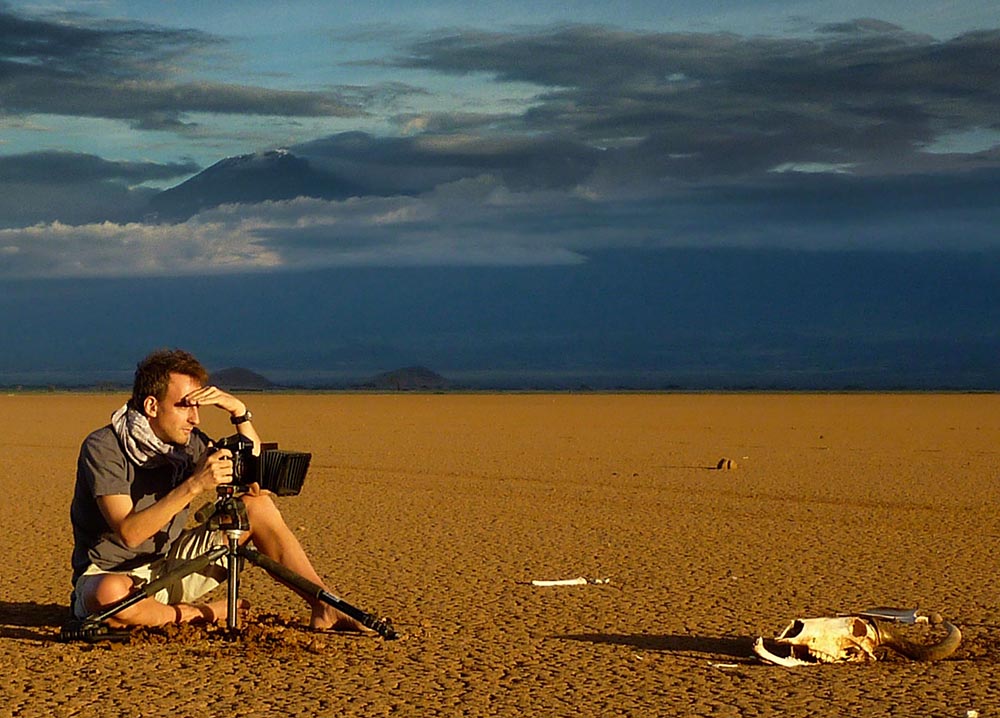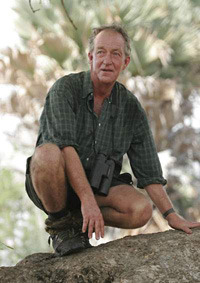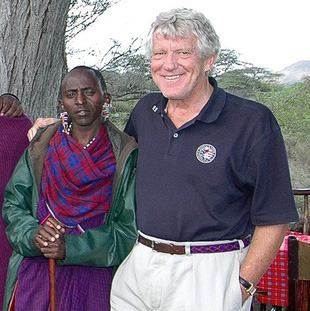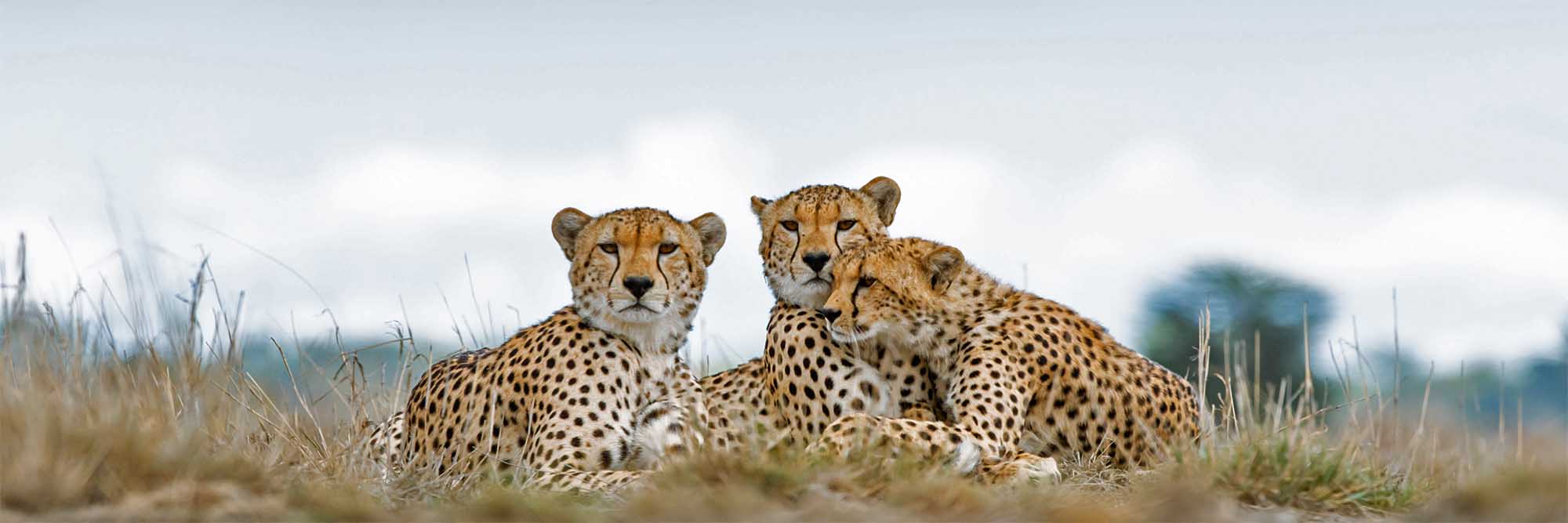Big Life was co-founded in September 2010 by photographer Nick Brandt, award-winning conservationist Richard Bonham, and entrepreneur Tom Hill.
Nick Brandt
 Born and raised in England, Nick first visited East Africa in 1995 whilst directing Earth Song, a music video for Michael Jackson. Nick felt that there was a way to photograph animals in a way that at that time no-one had done before —attempting to portray animals as sentient creatures not so different from us. As a result, Nick decided to switch careers.
Born and raised in England, Nick first visited East Africa in 1995 whilst directing Earth Song, a music video for Michael Jackson. Nick felt that there was a way to photograph animals in a way that at that time no-one had done before —attempting to portray animals as sentient creatures not so different from us. As a result, Nick decided to switch careers.
Starting in 2001, he embarked upon a decade-long photographic project: a trilogy of books to memorialize the vanishing natural grandeur of East Africa and its escalating destruction. Completed in 2012, the titles of the three books form one consecutive sentence: "On This Earth, A Shadow Falls, Across The Ravaged Land."
Many of the photos over the years were taken in the Amboseli ecosystem of Kenya and Tanzania, where in 2010, no longer able to sit back and allow the destruction to continue, Nick co-founded Big Life Foundation with conservationists Richard Bonham. As Nick writes, "There’s little use being angry and passive. Much better to be angry and active."
Since then, the themes in Nick’s photographic series always relate to the destructive impact that humankind is having on both the natural world and now humans themselves too.
In 2015, Nick released “Inherit the Dust,” in which, in a series of epic panoramic tableaux, he records the impact of man in places in East Africa where animals used to roam. In each location, life size panels of his animal portraits are placed within a world of explosive urban development, factories, wasteland, and quarries.
Film director Kathryn Bigelow wrote about this work:
"Nick Brandt’s harrowing but stunning work brings us face to face with a crisis, both social and environmental, demanding the renewal of humanity itself."
In 2019, Nick released “This Empty World.” This new project, addresses the escalating destruction of the African natural world at the hands of humans, showing a world where, overwhelmed by runaway development, there is no longer space for animals to survive. The people in the photos also often helplessly swept along by the relentless tide of ‘progress’.
E.O.Wilson, Theorist, Biologist, Author, wrote about this work:
"The astonishing images in “This Empty World” deliver the emotional shock rarely felt, but urgently needed, to accelerate global conservation.”
In 2021, Brandt released the first chapter of an ongoing global series, The Day Must Break, photographed in Kenya and Zimbabwe, that portrays people and animals impacted by climate change, environmental degradation and destruction.
Photographic historian Philip Prodger summed it up thus:
"A landmark body of work by one of photography’s great environmental champions. Brandt portrays people and animals together, causing us to reflect on the real-life consequences of climate change. Channeling his outrage into quiet determination, the result is a portrait of us all, at a critical moment in the Anthropocene.”
The second chapter was photographed in Bolivia in 2022, and in 2023, Brandt released SINK / RISE, photographed in Fiji. This third chapter of The Day May Break focuses on South Pacific Islanders impacted by rising oceans from climate change. The people in these photos, photographed underwater in the ocean, are representatives of the many people whose homes, land and livelihoods will be lost in the coming decades as the water rises.
The Echo of Our Voices, the fourth chapter of The Day May Break, was released in 2024, and features rural families, who fled the war in Syria, now living in Jordan.
Jordan is considered the second most water-scarce country in the world. Living lives of continuous displacement due to climate change, the Syrians are forced to move their homes up to several times a year, moving to where there has been suffiicent rainfall for crops to grow, and with that, temporary employment. The stacks of boxes that the families sit and stand together on provide pedestals for those that in our society are typically unseen and unheard.
The Day May Break… and the world may shatter. Or perhaps…the day may break…and some kind of dawn still come. Humanity’s choice. Our choice.
Brandt has had solo gallery and museum shows around the world, including New York, London, Berlin, Stockholm, Shanghai, Oslo, Paris and Los Angeles.
His work can be viewed at nickbrandt.com.
Richard Bonham
 Richard is the son of an early well known Kenyan Game Warden, Jack Bonham. This meant he had an early and vivid introduction to Wildlife, the bush and conservation. After a spell of bush flying in the Sudan, Zaire and East Africa Richard went into the safari business, concentrating in walking safaris in the remoter and wilder parts of East Africa.
Richard is the son of an early well known Kenyan Game Warden, Jack Bonham. This meant he had an early and vivid introduction to Wildlife, the bush and conservation. After a spell of bush flying in the Sudan, Zaire and East Africa Richard went into the safari business, concentrating in walking safaris in the remoter and wilder parts of East Africa.
In the mid-80's, Richard negotiated a 300,000 acre concession on a Maasai-owned ranch, Mbirikani Group Ranch, where he still currently lives. This ranch forms an integral part of the Amboseli ecosystem. It became clear to Richard from the outset that the only way that the Wildlife and the habitat of the area could be sustained was to partner and involve the local community themselves, through economic incentive-based conservation enterprises, employment and participating in law enforcement themselves.
Richard pioneered the Community Game Scout concept in the late 80's by employing four local Maasai warriors to collect snares which were appearing in growing quantities, 20 years later this the project has expanded to employing and training over 100 game scouts from the local community and operating over most of the ecosystem. In 2009 alone, working closely with Kenya Wildlife Service, these dedicated scouts prosecuted over 500 poachers and illegal loggers. (This number could and should be doubled with better resources and logistical support. These scouts also double as general security for the area, protecting farms from crop raiding wildlife, following up stock theft and crime so providing an appreciated service to the community.)
Richard's conservation history is not limited to the law enforcement approach, The Maaasailand Preservation Trust which he started has played an integral part in setting up health clinics, schools and a Wildlife scholarship program that has put hundreds of students through school.
The Maasailand Preservation Trust also pioneered the a Predator Compensation project that now covers over 700.000 acres of the ecosystem, This economic incentive based approach is attempting to turn the tide of looming local extinction of predators. These predators, especially lion, are being killed in retaliation for their killing of livestock, on which the local community depend upon for their livelihood.
Rhino have also figured in Richard’s conservation history. In the mid 90's he was a key player in setting up the Selous Rhino Trust, and at home in the Chyulus, his scouts, together with KWS, are working around the clock to preserve what is probably the last unmanaged Black Rhino populations in Africa.
On November 26, 2014 in London, Richard was awarded The Prince William Award for Conservation in Africa at the Tusk Conservation Awards.
Tom Hill
 We were deeply saddened by Tom Hill's passing in July 2024. However, his legacy will live on through the work we do at Big Life. Click here to read A Tribute to Tom Hill, written by co-founder Richard Bonham. In Richard's words, we will hear Tom's voice every time we hear a lion roar.
We were deeply saddened by Tom Hill's passing in July 2024. However, his legacy will live on through the work we do at Big Life. Click here to read A Tribute to Tom Hill, written by co-founder Richard Bonham. In Richard's words, we will hear Tom's voice every time we hear a lion roar.
Tom Hill, a graduate of the University of Texas and the Wharton School of Business (MBA in Finance) was a New York City-based entrepreneur for more than three decades. He co-founded Shoppers Voice, Inc. in 1968 (“the first interactive communications medium” according to The New York Times). The company later expanded its scope and was re-named Newmedia Marketing Companies, Inc., maintaining long-term client relationships with Nestle, Unilever, Colgate-Palmolive, and Toyota, among others, after which he began a consulting firm that for years served leading multinational companies (including Royal Dutch Shell and Marsh & McLennan Companies). In the 1980s and early 1990s, he was also active in private equity.
Having been a co-founder of the Institute of Human Origins in 1981 and The Trust for African Rock Art in 1996, Mr. Hill chose in 2000 to devote himself fulltime to philanthropic and non-profit endeavors. He moved to rural Kenya, where he was a co-founder of the Maasailand Preservation Trust, whose mission was to stabilize and sustain the Amboseli-Tsavo ecosystem at the base of Mount Kilimanjaro. MPT eventually merged with Big Life, where Tom continued to be involved as a Co-Founder, Board Director, and Treasurer for many years.
In 2003, Mr. Hill and his colleague Richard Bonham created what would ultimately become Big Life's Predator Compensation Fund, an innovation in wildlife conservation strategy that has proven highly successful at saving the great predators of the region–especially lions–reversing their otherwise imminent extinction in the very cradle of their existence.

